 |
| ©Barry Feinstein |
.jpg) |
| © Jan Dalman |
 |
| © Bernard Cole Archive |
 |
| © Sylvia Plachy |
 |
| ©Barry Feinstein |
.jpg) |
| © Jan Dalman |
 |
| © Bernard Cole Archive |
 |
| © Sylvia Plachy |
On a cold winter’s day in early 1962, Brian Epstein and the Beatles huddled together contemplating their failed bid for a Decca recording contract and the bitter aftertaste of rejection that left emptiness in their stomachs. But hunger can feed ambition. Disappointments would ensue, but almost immediately Epstein would be the proverbial right man in the right place at the right time and meet a string of people who were looking for something not-quite-exactly unlike the Beatles.
The first full week of February 1962 would prove to be one of the most remarkable in the Beatles story. On Monday, 5 February, the Beatles’ drummer Pete Best — whom they had still not informed of Decca’s decision — called in sick and his band mates recruited an old friend from a rival band. Ringo Starr appeared that night with Lennon, McCartney, and Harrison in Southport, a city just north of Liverpool where perhaps his dry humor helped ease the pain, just as his personality would help anchor the band two years later as America exploded around them.
Although Decca artist-and-repertoire managers Dick Rowe and Mike Smith had turned them down, Epstein returned to London to argue for reconsideration. Over lunch in London on Tuesday, 6 February, Epstein sat politely arguing with Rowe and Sidney Arthur Beecher-Stevens, Decca’s sales manager, in an attempt to change their corporate mind. Rowe notoriously and with great self-confidence recommended that the manager return to record retailing in Liverpool. They were the experts. They knew these things.
Epstein did win a small “concession” from them: Rowe offered to arrange for ex-Shadow drummer Tony Meehan to produce the Beatles at Decca if the manager agreed to cover the expenses of about £100. Epstein kept his options open and made an appointment for Wednesday, 7 February to meet with Meehan whose squeaky-clean reputation and pop credentials the manager would have found appealing. Still, little about the meeting satisfied the manager. Meehan arrived late (Epstein’s bête noire) and his condescending comments about the Beatles’ audition only added salt to the wound. An interesting moment of musical potential slipped into history; but, the planets were still moving and, on Thursday, the orbs began coming into alignment.
With the addresses of other record companies in London and a copy of the Decca audition tape, Epstein employed this magnetic artifact in his quest to win a contract for his “boys.” Nevertheless, a quickly arranged meeting at Pye Records, the third largest label in Britain, also ended in disappointment. Executives at EMI, the largest music corporation in Britain, had already declined Epstein’s request for an audition even before Decca had accepted. His options narrowed.
Epstein realized that the medium might present the problem: an audition tape clearly made at Decca indicated that the label had rejected the material. What record executive would want to sign performers that another label had already rejected? Epstein knew that EMI’s HMV store near the Bond Street underground station had a service that would transfer taped material to disk. Certainly, a disk would say “important.” Conveniently, Epstein also knew the store manager.What transpires on Thursday, 8 February arguably shifts the course of musical history. Combining a social visit with the need to t
Back to work in a real way this morning. Last night I had several breakthroughs while on my walk (exercise is part of process!), which catapulted me out of bed this morning, eager to get to work.
Breakfast on the porch this morning while I contemplate my progress so far this month. It never fails to amaze me how the slog slog slog of days turns into a white-heat for me. I know it's different strokes for different folks. Some writers must write every day. Some go for weeks without writing a word, while soaking up whatever it is for the next story, or coaxing it to the surface.
I am more in the latter camp. Unless I am on deadline, I go for days without writing the actual story at my laptop, but I don't let a day go by without scribbling in my notebook. Of course, right now, during this white-heat, deadline time, I am writing/revising the story, at my laptop, every day.
I use my notebook daily -- even if it's for a to-do list or a grocery list and that's it -- even when I'm traveling (esp. when I'm traveling -- I write on airplanes this way, in the interminable waits on takeoffs and landings, and then I transcribe to my laptop). The physical act of writing in my notebook keeps my writing pump primed.
Here is some of what I have scribbled in my notebook about the novel in the past three days. I haven't corrected spelling or grammar, as this is stream of consciousness, and also quick-recording. Here it is, just as I wrote it.
You can see, there is lots of personal narrative in here -- I am taking my life -- my ten-year-old life -- and turning it into story, a totally made-up story.
----------------------------------
This morning's breakfast, at 6am: homemade oatmeal topped with a few cranberries and walnuts, with a bit of Fage yogurt on the side, and a copy of the 1947 textbook MAKERS OF THE AMERICAS.
This book broke it open for me yesterday... I am cautiously saying this, because who knows (I know you know what I mean), I have a new chapter one (for the third time in as many years) and I think it may be The One. But I've thought this before.
Yesterday, as I committed to my 15 uninterrupted minutes and then another and another 15, I did indeed sink right down into story... and you know, that break every 15 minutes (or hour, or however it works for you/me each day -- and each day is different)... that break makes all the difference.
In my breaks I toted some of our two cords of firewood to the various covered resting places it will occupy this winter. (We did not beat the rain, but we're over halfway done, and everything is tarped... and the rain on my tin roof sounds like drizzle this morning, not a downpour, which would seriously impede our efforts.)
I made pumpkin muffins for Hannah (her request) and will try to box them up and send them to Ohio today, where she is putting in long hours working for the Obama campaign (oh, the stories!). I'll include something Halloweenish in the box, and I'll stick her mail in there, too, and a surprise.
I stuck close to home and close to story yesterday, and my reward for those focused writing times followed by the release of the puppy-mind to go play/exercise was the magical gift of a new beginning for this novel. I read through my pitiful "what does Franny want?" list that I posted yesterday, I wrestled with how to put something to represent that in the first chapter in a real-life, action-oriented way, and as I sat there, word-wrestling, a phrase came to me: I am invisible. I wrote it down. It came to me in the way that Comfort's words in LITTLE BIRD came: I come from a family with a lot of dead people.
From that sentence came the rest of the chapter. Where did it come from? I wrote for two hours with every window and door around me open. The muffins cooled, the firewood waited, the tiny morning fire died, and the October breeze set up a whooshing through the trees and around my shoulders with a clear sign of a front coming in.When I looked up, I had to put myself back in 2008. I had sunk deep down into 1962 and I had a brand-new scene, a brand-new beginning, and a way to look ahead. I took a break -- moved wood for an hour and figured out next steps in my head... was excited to get back to the page.
Here's how the rest of the day went:
Read the new chapter out loud, heard the holes. Revised. Took a break. Read the chapter out loud, saw how this new first chapter is really chapters one and three. I can use my current (as of the last revision) chapter two between the brand-new chapters one and three. Shuffle. Revise. I think this will work.
I ate little supper (leftovers)-- my mind is not in my stomach. Called it a day and watched the debate (save me -- us). Couldn't resist one more read-through, so read the new material out loud, in bed, to Jim (very romantic - not). He asked great questions and gave wonderful encouragement, which I need so much right now. Slept on everything.
When I woke at 5:30, I was eager to get back to it -- this hasn't happened in so very long. For so long this novel has been a complete and utter slog, and today, voila, it's a pleasure, a real pleasure. I began reading yesterday's new chapter before the coffee was ready, and I made my oatmeal (I'm finding that carbs in the morning help) while scribbling in my notebook all my new discoveries, my new questions, my wonderings... because that's what I do best -- wonder. And then explore.Heavens to Murgatroyd, I think I may be finally moving forward again. So, so much to do in this month ahead. I can't look at that. I need to keep blinders on and just move forward. Trust. Make a mess if I have to -- remember the rules of The Magic Schoolbus? I put them, front and center, at the top of my syllabus for ECED422, "Writing Techniques for Teachers" when I taught at Towson University:
Take Chances.
Make Mistakes.
Get Messy.
Yep.
C'mon -- let's write today.
I'm so eager to be back in Franny's world again this morning and I'm psyched about moving forward -- what will I discover? I hope you'll indulge me and wait on my post about the new picture book... it's coming, I promise. I need to ride the white heat I'm in with this novel -- who knew it would come? I try to trust the process, I do, but probably, deep down, I'm not sure I truly believe a story will crack open again for me, I'm never sure the white heat will be here again, and then... voila.
And I never know how long it will last. To work.
"Not all who wander are lost."
-- J.R.R. Tolkein
I want to make a strip quilt. I want to sew prayer flags. I want to carve pumpkins and toast the seeds. I want to nap. I want to organize my pantry and rearrange the contents of my kitchen cabinets. I want to chop carrots and make soup. And more soup. I do not want to mop the kitchen floor.
I need to stack firewood -- it's supposed to rain tomorrow. I need to clean the bathroom. The car needs to go to the shop. I haven't been to the dentist in four years (don't say it). The grass needs mowing, the garden needs putting to bed. I've stopped composting. Again.
Paperwork looms. LOOOOOOMS. The political climate is making me crazy. Of course I will have to watch the debate tonight.
And what about the Pilgrimage to Mississippi I wanted to take in September? Oh. It's October. I've got 30 days left at home before traveling in November/December: Seattle, Nashville, Augusta, D.C. In December, I'm teaching personal narrative writing to third graders. My *mind* is in third grade right now, spider-webbing in every direction possible.
What to do? Buddhist Jack Kornfield says we must "train the puppy" to concentrate. So here I sit, bringing my puppy-mind back to the page, over and over again.
Sometimes, however, I give in to the endless lists and the cacaphony of craziness in my head and my mind wanders, distracting me from the task at hand..., the task being to draft this novel, understand my story and storylines, and finish, finish.
Instead, I think it's too hot, too cold, too early, too late, there's not enough time, there are too many interruptions... on and on goes my blender-mind, whirling my writing hours into frothy, insubstantial bubbles.NOT TODAY. Not today! Today, and every day this month, I promise myself 15 uninterrupted minutes. And then 15 more. Soon I'll have an hour, and when I look up again, three. I know how it works, if I Just Do It.
I want to go to IKEA.
BIC! BIC, as I tell my fourth-grade students. BUTT IN CHAIR. Turn off your email, I tell my students, don't play computer games or IM your friends, or get on the telephone -- no texting! I must take a dose of my own medicine -- I subbed to a bazillion political blogs this crazy election season, and this morning I summarily wiped them off the face of my RSS reader. I must. I must. Otherwise, I will peek all day long. Now to deal with email...
Make a pact with yourself, I say to my students, a pact to stay at the page, only at the page, even for just 15 minutes, and see what happens. This is how the magic comes. And it IS magic, in part... magic coaxed into being by discipline, concentration, focus -- training the puppy, not wandering.
A novel is a complex puzzle, like these quilts I love and collect. Can anyone identify the patterns in these quilts? I don't know the patterns but I love quilting -- so far, I'm a rag quilter only, but I want to branch out. I want to learn the patterns.
In my novels, readers don't need to see my patterns; they will intuit that they are in good hands if I do my job well. Readers will absorb the patterns in the way that I absorb the beauty of these quilts... the person who needs to understand the pattern is the maker, so I must stick with it today, reading, refining, thinking about patterns, themes, overall arc, structure. Cut, paste, sew, rip out, piece, tie off... I have my work on a quilting frame today, and I am a quilting bee of one.
I'm also deep into too-many metaphors, a sure sign I am that wandering puppy. So I'll stop and go to work. I'll eat well (last night's supper included leftover cornbread broken into homemade miso soup). I'll get up and stack firewood at the end of a fifteen-minutes or hour or three, and tonight I'll fall into bed exhausted, I'm sure, just as I did last night.
I won't measure progress by how much I get done on the page. Just as much work is being done in that non-wandering mind. Then, when I let it romp, when I stack firewood or climb Stone Mountain this afternoon, that puppy will give me the answers to hard questions I've been wrestling with. I trust that... and then, back to the page the next day, repeat.
Thank you all for those lovely guesses about and congratulations on the Big Book News -- thanks so much. YES, you are *all* right! I'm birthing a new picture book. This is my first picture book sale in ten years. It was a long pregnancy. (Metaphor Alert. Stop. Now.)
I want to share the process with you -- how an idea grew into a book -- as part of 30 days of process. So tomorrow: contest winners and the anatomy of a new picture book. But for now, 15 minutes. Another log on the fire, and another 15 minutes.
Sinking down, down.... into the magical world of story.
 I've disabled comments, in an effort to streamline mail. You'll see my email address now listed in the left-hand column. If you're using my old email address, please keep doing so; all mail will migrate to one address. Blah blah blah. Housekeeping!
I've disabled comments, in an effort to streamline mail. You'll see my email address now listed in the left-hand column. If you're using my old email address, please keep doing so; all mail will migrate to one address. Blah blah blah. Housekeeping!
Here's what I'm thinking about this morning as regards the novel and the sixties:
When I was a kid, I used to lie in bed at night, after saying my prayers with my mother listening, after reading under the covers with a flashlight, after listening to my parents' television in the bedroom next to me sing out "Heeeeeere's Johnny!"... after all that, I drifted to sleep to a letter I composed in my head, to Nikita Khruschev. It was 1962, and in school I was ducking and covering under my desk, practicing for an air raid, afraid of the Russians and rockets and war.
The idea of peace seemed so simple to me. I was sure that if I could just sit down with Chairman Khruschev and President Kennedy in a room together all by ourselves, I could explain to them how easy it was to understand that we shouldn't hurt one another, because we all had mothers and fathers and brothers and sisters and sons and daughters and... well, we all liked meatloaf and potatoes and we all liked to play kickball or baseball or lie on our backs in the grass and spy rabbits or cars or George Washington in the clouds.
I'd lie in bed, staring at the pink canopy in shadow above me, and marvel at how I could see this and they could not. I also thought I must possess some sort of mystical, magical something that allowed me to see this -- it was so clear! And yet I never talked about this to anyone. It was just something I knew, and yet at the same time I felt wildly unsure of saying it out loud to anyone... I mean, who was I to know such a thing, after all? I was nine years old.
In October 1962, Americans gathered around television sets and listened to JFK tell them about the threat of attack from Russia using missles from Cuba, and I fell asleep composing my letter to President Kennedy, asking him to allow me some time to speak with Chairman Khruschev.
I never wrote that letter... but maybe, in my novel, Franny does. That's what I'm thinking about this morning.
Have you ever had that thought, "if they'd just listen to me, I could explain it"? What did you want to explain? And to whom? Write a page about it in your journal or writer's notebook. Try to make it about one clear moment in time. See what comes up. You never know where it might take you:
"If they'd just listen to me, I could explain it, I could help." Were you scared? Were you angry? Were you... what? Write from your head, your heart, and your gut, the three places that story comes from: what you know and remember, what you feel, and what you can imagine. Then -- share it with someone. A story becomes complete when it is shared.
photo from the U.S. State Dept. in the JFK Library and Museum, Boston
 "From the dawn of man's imagination, place has enshrined the spirit." -- Eudora Welty
"From the dawn of man's imagination, place has enshrined the spirit." -- Eudora Welty
If you are of A Certain Age, you will recognize the title of this post as a song title as well. Sung by Petula Clark in 1965, it's one of the songs on my playlist for the Sixties Trilogy, and it's your notebook assignment for today.
"I know a place where we can go..." Where?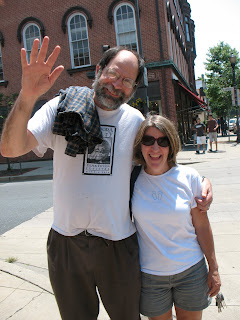
In 1995, I took a class from a fine poet named Nancy Johnson at Frederick Community College. I had been publishing essays -- personal narrative writing -- for years in newspapers and magazines, I had been writing magazine features and had even been a magazine editor, but now I wanted to turn my attention to fiction. Nancy taught me (among other things) that fiction grows naturally out of personal narrative -- the old "write what you know."
Now I tell my students that story comes from your head, your heart, and your gut: what you know and remember, what you feel, and what you can imagine.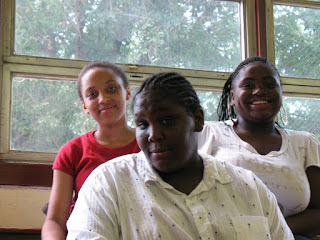 It's hard to write fiction without first understanding your personal narrative -- who you are and where you are from. This is especially important to know when writing with children. It's hard for fourth-graders, say, or middle-schoolers (aren't they beautiful?) or seniors in high school to sustain a fictional world when they haven't explored their place in their own world, when they aren't telling their own stories and understanding that those stories have heft and meaning and importance.
It's hard to write fiction without first understanding your personal narrative -- who you are and where you are from. This is especially important to know when writing with children. It's hard for fourth-graders, say, or middle-schoolers (aren't they beautiful?) or seniors in high school to sustain a fictional world when they haven't explored their place in their own world, when they aren't telling their own stories and understanding that those stories have heft and meaning and importance. One of the first assignments Nancy gave our class was to write about a place. She had us LIST places first -- places we had lived, visited -- every place we could remember, large (Mississippi), small (the fort I made under the stairs), it didn't matter -- but a physical place.
One of the first assignments Nancy gave our class was to write about a place. She had us LIST places first -- places we had lived, visited -- every place we could remember, large (Mississippi), small (the fort I made under the stairs), it didn't matter -- but a physical place.
This is where notebooks come in handy. I listed and listed -- I brainstormed away -- nothing was off limits. This exercise was meant to get our memories flowing onto the page so that we could SEE them, physically, and choose one. One. You do the same. List... then choose one. Circle it. Choose one place you know, and write about it. Don't skip the listing step. I still, to this day, begin writing by listing. When I listed for this exercise, "Mississippi" was the word I circled. It was the place I chose to write about. I narrowed it down to Jasper County, Mississippi, and all the summers I spent there with my grandmother (the real Miss Eula), surrounded by the smells of summer and people who would populate my dreams for years to come.
Don't skip the listing step. I still, to this day, begin writing by listing. When I listed for this exercise, "Mississippi" was the word I circled. It was the place I chose to write about. I narrowed it down to Jasper County, Mississippi, and all the summers I spent there with my grandmother (the real Miss Eula), surrounded by the smells of summer and people who would populate my dreams for years to come.
I wrote a poem (more on this Nancy Johnson exercise another day -- if I forget, remind me), and from that poem I began a picture book called MISS EULA GOES TO HAWAII. I sent that picture book manuscript to Liz Van Doren at Harcourt Brace in late 1995, and in February 1996, Liz called me and asked me if I'd be interested in working on this story with her.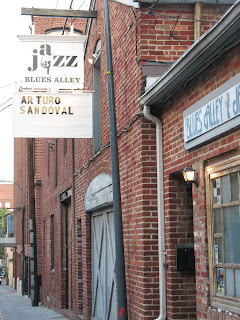
Would I? Would I! From the beginnings of trying to write for children to the day of this phone call, ten years had passed. Ten years of rejections, nibbles, more rejections, reading what I wanted to write, practicing, giving up, beginning again, joining a writer's group, leaving a writer's group, finding online support, finding solid resources (including this class at FCC), finding like-minded souls to travel with, and just plain hanging-in-there and refusing to give up -- perseverance. I had stories to tell -- I knew I did. I just needed to figure out HOW to tell them. Listing in my notebook helped me get started.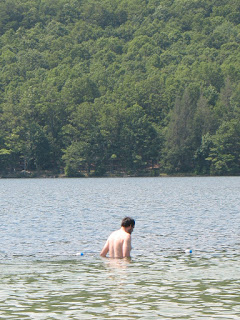 Two years into working with Liz on this picture book, she still had not bought it, the story got longer and longer, and I found myself writing a novel instead of a picture book. Liz gave me good advice at this point: "Let go of your memories, and tell me a story." And I learned to do that, to make that fictional leap. But all my memories -- all those lists -- were trusses for my stories. Without them, I would have no stories to tell.
Two years into working with Liz on this picture book, she still had not bought it, the story got longer and longer, and I found myself writing a novel instead of a picture book. Liz gave me good advice at this point: "Let go of your memories, and tell me a story." And I learned to do that, to make that fictional leap. But all my memories -- all those lists -- were trusses for my stories. Without them, I would have no stories to tell.
I left my day-job (freelancing everywhere) in 1997 in order to focus on what would become LOVE, RUBY LAVENDER. All told, it took me three years to get it right, to make it sellable, and another two years of revision before the book was published in 2001. Along the way, I wrote FREEDOM SUMMER, my first picture book, and sold it to Anne Schwartz at Simon & Schuster. It, too, comes directly out of my life and those notebooks that help me capture my life so I can SEE it, in front of me, in words, images (photographs help), thoughts, doodles. So.... what places do you know? And which one would you choose to write about today? It doesn't have to be a novel. Or even a picture book. How about a sketch? A poem? One paragraph of one moment in time you experienced in that place?
So.... what places do you know? And which one would you choose to write about today? It doesn't have to be a novel. Or even a picture book. How about a sketch? A poem? One paragraph of one moment in time you experienced in that place?
You can see some photos of Ruby's town, my Jasper County, here. I went back and took photos last summer. There are also some photos here, at my Life Notice on my website.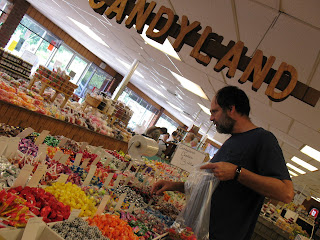
The places I'm showing you today were taken last week, during my scoot through Prince Georges County, Maryland, Frederick, D.C., and western Maryland. I've used my notebook to journal about each stop. I have photographs. And boy, do I have stories.
Any one of those memories I could mine for story. The present echoes the past... or does the past echo into the future? What I know is that my personal narrative -- my history -- informs my fiction.
RUBY is fiction, of course, pulled from personal narrative (as is LITTLE BIRD and ALL-STARS). RUBY narrates a place I knew, it remembers it in the golden light I loved to remember it in. FREEDOM SUMMER is also fiction, also pulled from personal narrative, and it narrates that same place in its not-so-shiny light. Both stories are true emotionally. And that's what I'm going for, in my fiction: emotional truth.
Fiction starts with discovering the emotional truth of your own life -- which can change, actually, with a deeper understanding of the people, places, and events that have defined you.
So pick that place. "You're gonna love this place I know." You can hear the song, sung by Petula Clark, here on YouTube. List, list, list. Pick your place. Pick one experience there. One clear moment in time. Circle it. Write short. Be true. Use telling details, and all your senses. If you need to write long at first, that's fine... you can cut later, and revise as your reason for writing about this particular place emerges... this is a gift of process.
Then write me -- share it with all of us -- what place do you know?
Place -- it's the backbone of story.
I think I'm turning into Aunt Bee. I looked in the mirror this morning and thought, "Aunt Bee. I'm Aunt BEE!" Let us not go here today.
I was up very early this morning, reading and researching, and one thing online led to another, the way it does, and soon I was reading "26 Things You Can Do RIGHT NOW to Manage Your Anxiety"at a site called Peak Oil Blues.
This depressed me. I did not realize I was that anxious. Then I read, in this article from The Guardian/UK, about America's love affair with the car (again, all this started as Sixties reading and sort of morphed), " "Suburbia has been unsustainable since its creation."
Come back, Aunt Bee! I wanna be Opie's age again!
Or do I?
In the early Sixties, the suburb was becoming king -- it had been growing and growling, monster-like, since Leavittown days. Gas was cheap, and Americans love-love-loved their big ol' cars. My father bought a new car every three years. He traded in the Olds for the Desoto, the Desoto for the Imperial, traded in the Chrysler for the... hmmm... what was it? There was a VW bug tossed in for good measure, along the way. I thought this was just the way it was done. I didn't realize that people could buy used cars and run them until their engines sputtered and wheezed into the junk heap.
Which is what I'm doing, although it may not be cost effective anymore. My car is 15 years old this year. I bought it used. The gas mileage is so-so. And it costs me close to $60 to fill my tank now. I guess that makes me anxious. Or depressed. Or... mindful, at least. I remember my father buying dishes at the Esso station, while he gassed up. A free glass with every fill up -- we bought the whole set of dishes once.
All apropos of nothing. Just thinking about those Aunt Bee days, the way we never were, supposedly, and listening to myself now, as I say, "When I was your age...." ::cringe, cringe:::
To lift my spirits, I read great writing. One of my heroes, Wendell Berry, is interviewed in The Sun this month. Somehow he manages to tell it like it is without depressing me. Favorite quote from this interview: "I don’t think we’re just stories — we’re living souls, too — but we’d be nothing without stories."
I feel better already.
Berry writes quite a bit about sustainability. I'm interested in sustainability today, on the planet, and at the page. I'm trying to write forward, revising what I've got so far, on the page, and pushing into new territory, trying to sustain my energy and focus not only for this story, but for the myriad of other tasks that lie on my desk asking for attention.
Kinship, community, connection. How do we create it, how do we sustain it? It's what I write about. I try to write even when I'm anxious, even when I start to resemble Aunt Bee.. here I am, at the page today.
I think I'll make me some pickles. You?
(Rat fink -- that's right, y'all are on the ball and know your Sixties trivia. Thanks, too, for the nods to worry birds, marbles, green plastic army men, and TROLLS!)
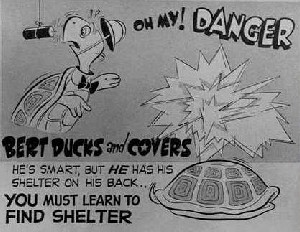 Look what I found on YouTube while researching END OF THE ROPE, my 1962 novel and the first of the Sixties Trilogy!
Look what I found on YouTube while researching END OF THE ROPE, my 1962 novel and the first of the Sixties Trilogy!
Here is the VERY (well, maybe not THE VERY, but it's VERY, VERY CLOSE)... the film I saw in elementary school about Bert the Turtle and ducking and covering and how to protect oneself against the dreaded Communist Nuclear Attack.
Oh, HOW this brought back memories... not only of those duck-and-cover air-raid drills (which I just finished writing about in chapter two of the new novel), but look at the way we dressed, look at how classrooms looked, how teachers dressed, how society structured itself... and notice that, in this nine-minute film, there is not one black face. Not one Indian or Latino or Asian face.
I'm writing (as a fictional story) my days at Camp Springs Elementary School in Camp Springs, Maryland. I'm writing about Andrews Air Force Base, where my father was stationed for seven years and was, for his last years there, Chief of Safety for the 89th MATS -- SAM FOX -- the squadron that flew (and still flies) the President of the United States. I'm writing about "the Communist threat." I'm writing about 1962, the space race, the Cold War, the Cuban missile crisis. I'm writing out of my life. (The patch below calls Sam-Fox the 99th -- anybody know why?)
From a research standpoint, there is so much I'm still culling through. And, from a fictional standpoint, creating these characters and their stories out of whole cloth, there is still so much I don't know.
I was nine in 1962. Franny, my heroine, is twelve. But her brother, Drew, is nine. Franny is a middle child. Drew is the youngest and only boy; he can do no wrong in the eyes of his parents. And why is that? WHY? I have struggled with this for so long from a story point-of-view... it's okay for Drew to be the golden child, but I want, as the writer of the story who is creating 1962 (and, in addition, if I do my job well, a universal story) for the reader, to know WHY Drew is the golden child.
He had rheumatic fever last year. That's what happened to Drew... and that's what happened to his family. Ohmygolly. OHMYGOLLY. This changes so much. I have been working on this novel, off and on, and now relentlessly, for over ten years. I had no idea about rheumatic fever... don't really understand what it is. But my friend MikeM., who was born a year after I was... he understands.
Long ago, maybe almost twenty-five years now, MikeM. told me about his struggle with rheumatic fever when he was 12. His heart was forever damaged... and seven years ago, MikeM. had a stroke, partly as a result of the rheumatic fever... so he has been much on my mind, and now I see that my undermind has been chewing on this story...
... and suddenly, sitting here at the page, day after agonizing day, trying to figure out the relationship between Franny and her brother Drew, it comes to me, out of the ether, that Drew has survived rheumatic fever, and his family is so concerned for him, so worried about his health, his future... and I think, "why didn't I see this ten... five... two years, two MONTHS ago?"
Well... because it wasn't time yet. I could cite you chapter and verse that may or may not be right or true about how these things happen. I could say that my friend MikeM. came to our big family celebration in May and I hadn't seen him for some time and that, after that, I started thinking more and more about his life and our connection, and somehow his account of the harrowing rheumatic fever days of the early '60s crept into my consciousness as I wrote forward on this novel... and maybe that would be true.
And maybe not.
I don't know. But I do know that I wrote about these conversations, and those memories, in my notebooks -- twice. I wrote about it when MikeM. first told me this story, probably in 1980 (I have not looked up the particular notebook although I have it; I have a stack of old notebooks, as high as my waist, in my closet), and again in May this year, when I wrote for myself a wrap-up of the party. So somewhere, this fact was working on my subconscious, which is where Story is born.
We write out of our lives, whether we realize it or not. And we have to trust that what we need will be there when we need it, even if we cannot know what it is.
I think that Drew having had rheumatic fever fits so well into the fact that he projects such bravado now (he is convinced, for one thing, that he will be an astronaut), and it fits so well into my whole "we may be annihilated tomorrow" theme of this novel... I can hardly express this to you in a cogent manner, so I won't try any longer, except to say that I have felt so bereft about this revision in these past several weeks of slogging, even in the face of steadfast support from editors and agents and writer friends and a couple of select readers.
But, finally, I am learning and re-learning that it is only BIC -- Butt In Chair -- that saves me... isn't that amazing?
All the people you love and trust can tell you you're doing a good job, but you know when the story sings.. you know it, don't you? You know. Okay, I know... I can only speak for myself. But I know when I'm cookin' with gas, and this only happens when I am willing to keep my B in the C and SIT HERE with the story at hand, and be willing to jump down those dark rabbit holes and climb back up again, and try one thing and then another and then, suddenly, though a process I cannot begin to understand (let alone articulate, as you can see), say, "OHMYGOLLY! Drew had scarlett fever last year!"
And that explains everything.
Maybe you had to be there.
I've also got these l'il creatures mentioned in END OF THE ROPE. Franny has quite a collection of them, and she also calls her brother one of these... anybody know what they are?
Film at Eleven.
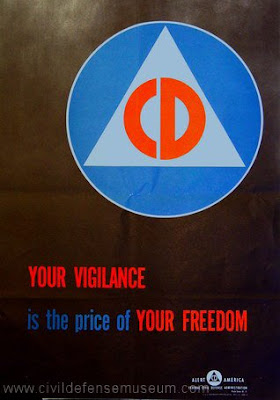
We're heading into a three-day weekend in the U.S., to celebrate the Fourth of July holiday. I took a couple of days off LAST weekend (photos to come), so I'm going to work this holiday. I'll be at my desk on Friday, the Fourth, but will knock off midday for a picnic with friends. Then, back to work.
And, even though I've extolled the virtues of my three weekends in a row OFF, I will likely work through this weekend and next, as I'm up against a deadline of pages due to my editor by the time I leave for Maryland/D.C. on July 14, a Monday. And I want to have those pages for her. I want to get to her as much of the 1962 book of the Sixties Trilogy as I can.
I'm continuing to cull through books and add to my arsenal of print Sixties materials. I'm also using lots of primary sources and some websites for checking data quickly -- here is where I've been clicking this week. It will give you an idea of what I'm writing --
John Glenn biography from NASA
Mercury Program photos of astronauts, etc.
Godzilla movies
Civil Defense sirens -- what did they look like?
The Civil Defense Museum. This is a fantastic site, full of audio and visual sights and sounds of the early Sixties civil defense days. Do you want to hear what my main character, Franny, hears when the civil defense siren begins blasting, signalling an air-raid drill? Click below:
Air-raid attack siren
Air-raid alert siren This is what Franny would have heard most, and what I heard as a kid -- I wanted to remember it... and it all came back to me as I listened.
I'm still trying to find an all-clear signal. Anybody know where I might find one?
Civil defense directions (audio) -- there are many of these on the above website -- what to do in the event of a nuclear attack, what to do if you are out in the open, if you aren't, and how to protect yourself against nuclear attack.
Franny's Uncle Otts, a World War I veteran, is the neighborhood's air raid warden. He takes his job so seriously that he plans to build a bomb shelter, right in Franny's front yard, much to the chagrin (and over the objections) of Franny's mother. Here's what his bomb shelter would look like:
Back to work for me -- just wanted to give you a glimpse into this project. Chapter one has been completely rewritten -- a completely new storyline finds it way into the book, and chapter one sings now -- this is a pre-requisite for me... I have to feel good about the first few chapters before I can really move forward, and this first chapter has been a bear. I'm well into a brand-new chapter two today, so back to it.
I leave you with the current first sentence of the book:
Tom West has more pimples than I do.
And here are two quotes I've used to start the book:
-- John F. Kennedy, President, The
-- Nikita Khrushchev, First Secretary of the Communist Party of the
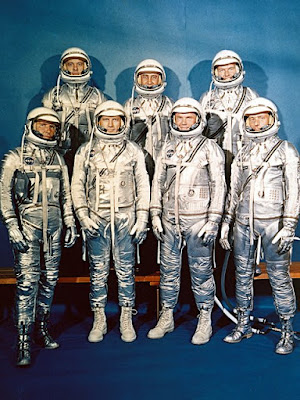

Just a quick note... no, two notes. Quickly.
Daughter Hannah writes to say that the misspellings she was referring to in her last note to me were referencing those first-graders' lovely notes to me. "I loved them!" she writes. Oh. Thanks. I'll still correct my typos.
A reader has passed on this Salon.com article about the Sixties, which is a review of Gerard DeGroot's new book, "The Sixties Unplugged: A Kaleidoscopic History of a Disorderly Decade," which debunks the decade as a total insignificance.
The review makes for fascinating reading (and it's thoughtful, not to mention well-written, always a pleasure). What do you think? The reviewer, Gary Kamiya, says that DeGroot "sets out to demolish once and for all the cant, hyperbole, romanticism, wishful thinking and just plain stupidity that continue to swirl around that era like a giant light-show blob."
Whoa! No decade is insignificant. No moment is insignificant. I have based my life and my writing on that premise. I have based the Sixties Trilogy on the premise that... well, here is a paragraph from my proposal:
"The 1960s was one of the most turbulent, changing, challenging, and defining decades in American history. It shaped a generation – and generations to come -- politically, socially, culturally, environmentally, musically… psychedelically. We are still living with the legacy of the Sixties – young readers are growing up within this legacy. What did it all mean? What does it mean for us today? For the future?"
Gerard DeGroot writes, "But cast aside the rose-tinted spectacles and we see mindless mayhem, shallow commercialism, and unbridled cruelty ... Revolution was never on the cards. Chauvinism and cynicism got the better of hope and tolerance."
Earlier today we posted an excerpt from Fibromyalgia: An Essential Guide for Patients and Their Families by Daniel J. Wallace, M.D. and Janice Brock Wallace. In this second excerpt, we look at the correspondence between depression and fibromyalgia. Are sufferers more likely to be depressed? Are depressed people more like to have fibromyalgia?
Is fibromyalgia a manifestation of depression or the reverse? Well-designed studies have addressed this issue, but many used different methods, populations, ethnic groupings, referral sources, and geographical distributions. (more…)
I've thoroughly enjoyed reading your books although I am twice the age of your intended readers. I wanted to comment on the rheumatic fever. My grandfather died of a massive heart attack at age 50. As a small child he had had rheumatic fever, but unfortunately no doctor ever picked up on how much his heart had been damaged.
From the stories I have been told by my Great-Uncle my great-grandparents felt the same way Fanny's parents do about Drew.(My Grandfather was also the youngest.) They had wanted to protect him, had treated him differently his whole life, but it still wasn't good enough. Their little boy was still taken too early. It makes perfect sense to me (as a future reader of your book) that Drew be treated as the golden child.
Kristin, here are my condolences, even decades later. Thanks for this thoughtful and heartfelt post... what a revelation. I have had little experience with rheumatic fever, and I am hearing from several readers... this is so helpful. Golden Child, indeed... your post helps me realize that Franny, even though she may not see it yet, must come to realize the nature of her family's fear about losing Drew... even if Drew doesn't see this, either. Such important thoughts -- thanks.
Is that critter a Rat Fink? I never had one, growing up as I did in West Virginia where everything seemed about a decade behind and some things just never made it to us, but my friend Elaine is a total geek for a rat fink.
Ann -- yes, that critter is a rat fink!! Thanks for reading and commenting -- and thanks to your friend Elaine who remembers and reveres those lovely, finky creatures!